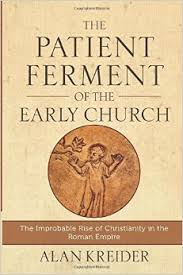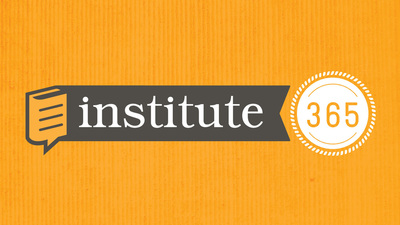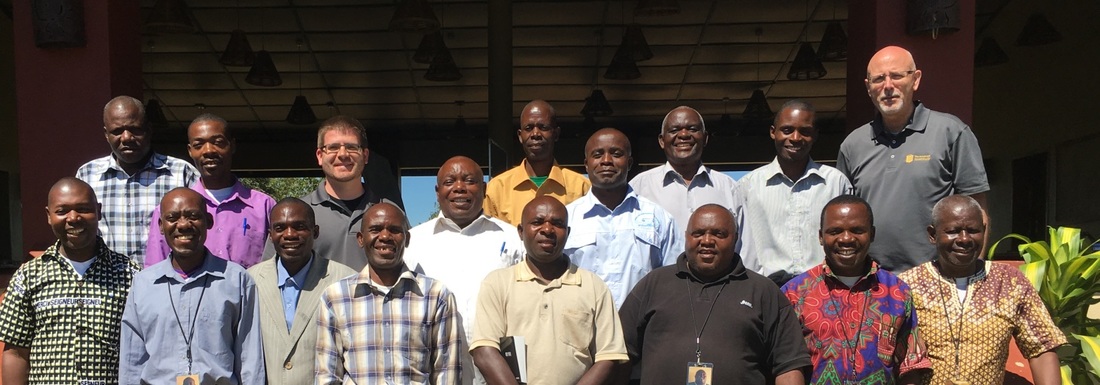|
This post is a (very slightly modified) duplicate of a post I wrote about a year ago. Since Brookside has recently read through Jeremiah 29 as part of the 365 Reading Plan, I figured it was fitting to update and re-post. It doesn't take much for Christians to look around and observe that - in certain important, noticeable ways - our cultural landscape "looks" less Christian (from the standpoint of a traditional Judeo-Christian ethic) than it did even a few short decades ago.
As we notice these shifts, it's important that Christians NOT respond in panic or fear. Rather, we as Christians need to keep asking ourselves the sorts of questions we should ALWAYS be asking: What does faithful Christian living look like in our culture? What does faithful Christian living look like when we interact with others who hold different values - perhaps very different values? Or the specific question we'll be considering in this post: How can we as Christians keep our footing amidst the shifting soils of our larger culture? Thankfully, we are not left to ourselves on how to answer this question. Back in the time of the Old Testament prophet Jeremiah, God's people spent some time exiled from their homeland. In this environment, they could look around and easily observe how much distance there was between their values as God's people (values given to them by God), and certain values of the dominant culture. In Jeremiah 29, we see how the Lord counseled His people to keep their footing in the midst of this situation in Jeremiah 29. I read through this chapter again recently (I encourage you to read through the whole chapter as well), and see great wisdom in listening to five things we learn there:
0 Comments
Earlier this week, the Brookside Institute offered a seminar on "How to Profit from the Prophets." About 50 people signed up for 90 minutes of overview on the prophetic books, and a glimpse into the book of Daniel - good stuff! As the Institute seeks to build and reinforce foundations of the Christian faith in the areas of biblical literacy and theological formation, seminars like this play an important role.
Below I've included some things that will give you a taste of the seminar. Here's the "Table of Contents" for what follows in this post if you keep scrolling:
The prophetic books that finish off the Old Testament make up a big chunk of our English Bibles. And for many, reading the Old Testament prophets can be "weird and confusing." Just this morning I was talking with a group of guys who affirmed a certain struggle with reading these prophetic books. They said the books are harder to follow than other parts of the Bible, and there are lots of "huh?" passages. One thing these guys specifically asked for (with no specific prompting from me) was a timeline to help situate the prophets historically. Where do different prophets fall in the larger timeline of Israel and Judah's history? I was able to update a chart I made a few years ago, and figured I'd make it available here for a wider audience. My only disclaimer is that this chart is an APPROXIMATE timeline of the prophets. I really wanted to get an introductory sweep of the prophets on just one page - and so that "trumped" other layers of detail that would have offered greater precision. With that said, see the "Old Testament Prophets Approximate Timeline" below! Thanks to Dr. John Holmes of Grace University and Dr. Eric Smith of The Pillar Seminary for glancing over this and offering some feedback. The chart is better for their contributions, and any deficiencies remain my own. :)
From the earliest days of the church in the centuries following the death of the apostles, an intentional "training program" (or catechesis) was developed to form and shape believers in the Christian community. Why was this track of catechesis important? Alan Kreider points out a key reason in his The Patient Ferment of the Early Church: The Improbable Rise of Christianity in the Roman Empire: "...believers knew that their practices [i.e., their noticeable, distinctive Christian lifestyles] were not acquired genetically or absorbed from pagan society. As Tertullian puts it around AD 200, 'Christians are made, not born'" (p. 134).
Those following Jesus took intentional steps to be transformed by the renewing of their minds (Romans 12:2); they took intentional steps to be made new in the attitude of their minds and to put on the new self (Ephesians 4:22-24); they took intentional steps to make sure they were strengthened and encouraged in their Christian faith (cf. 1 Thessalonians 3:2). A key part of these "intentional steps" was a value placed on catechizing (i.e., intentionally training) those in the Christian faith. It's important to note that a number of different components were included in catechesis. Catechetical practices developed over time in the first few centuries. And no single approach seems to be have been adopted everywhere as the early church grew. We need to acknowledge the numerous layers and the diversity that characterized catechesis. Nevertheless, catechesis was valued. As Kreider points out in The Patient Ferment of the Early Church, by the fourth century we have enough samples of catechetical priorities that we can present a composite picture of what the early church included in their catechetical content. So (more simply), what did the early church teach? A few weeks ago in Brookside's 365 Reading Plan, we took the turn into prophets (books like Amos, Hosea, and Isaiah). These prophetic books make up a large part of the Old Testament, and can seem weird and confusing at times. In his book The Bible Jesus Read: Why the Old Testament Matters, author Philip Yancey sums up the experience of many this way:
My guess is, many of us resonate with the answer expressed in this quote. But what if we're missing something huge by skimming (or neglecting) the prophets?
The more I dig into the prophets myself, the more convinced I become of the TREMENDOUS importance of their message - and its continuing relevance for our lives in the 21st century. Convinced of this, I invite you to join us for a "How to Profit from the Prophets" Institute seminar on Wednesday evening, May 25, 2016. In about an hour and a half, we'll work (1) to stir your motivation to read the prophets (so you'll WANT to dig into these books) and (2) to give you some tools by which you can do so (so you're equipped to better navigate these books). Whether you're an attendee of Brookside Church or are simply in the Omaha area and want to dig into this a little more deeply yourself, we invite you to join us. There's no cost to attend, but you can help us know how to plan by signing up here. Interested in other seminars that the Brookside Institute will be offering this year? Or do want to see some things we've already done that line up with what Brookside Church is doing as we read through the Bible? Click here to see more.
Assuming I've been keeping tally of things correctly, you're officially reading Post #200 on this Brookside Institute site! Over the course of the last 12 months, we've had 16,600+ unique visitors to this site, and over 87,500 total page views. Whether this is your first intro to who we are or you've been tagging along for a while, thanks for joining in!
As the posts continue accumulating, I don't want that to keep us from looking back every now and then - to review what the Brookside Institute is all about, and for me to mention posts that are either some of my personal favorites or that have gotten lots of traction. These sorts of "review posts" also serve as a sort of index (or Table of Contents?), organizing the material and helping orient you to who we are and what we're about at the Brookside Institute. What I've done with this post, then, is organized some links under the following categories:
Underneath each category, I've included a short list of links to pages on this site where you can learn more about who we are and what we're up to. My recommendation? Scroll through the index that's below, and find 3-4 posts you want to check out. This is a great way to see what we're doing and get to know the Institute a bit better! What is Moralistic Therapeutic Deism? And How Does it Stack Up Against Biblical Christianity?5/10/2016 Every now and then, a new word or phrase is coined that takes on a certain life of its own. Sometimes, the word or phrase catches on because of its novelty or popular appeal - think of "yada yada yada," for example.
Other words catch on because they accurately label something that people have been experiencing, but don't yet have a term for - hence the words "tween" and "emerging adult" are now commonplace. Other words in this category may not be as widely used as "tween" but they're nevertheless very important, because of how they accurately and succinctly describe something that seems to be going on around us, that we need words for. This is where I'd like to introduce you to one such term (if you've not heard of it already), Moralistic Therapeutic Deism. It's tough to overstate how important of a term "Moralistic Therapeutic Deism" (MTD) is. In an article on Moralistic Therapeutic Deism, sociologist Christian Smith suggests it is the "de facto dominant religion among contemporary teenagers in the United States" (p. 46). In other words, MTD is the default, often-unconsciously held, religious perspective/worldview among many teens and emerging adults. Even if you've never heard the "Moralistic Therapeutic Deism" label before, it's likely you've encountered one of the many ways MTD sends ripples out into many different areas of society. You may have experienced some variant of MTD in a religious service, a conversation with someone else, or in your own default perspective on things. If Moralistic Therapeutic Deism is so prevalent and is such a big deal, there are at least two important follow-up questions that readers of this post are invited to ask: What exactly is Moralistic Therapeutic Deism? And how does it stack up against biblical Christianity? Let's dig more deeply into each of these. For much of the second half of April, I was helping train pastors in Zambia as part of the Hope Center Pastor Training School near Serenje. While I was there and teaching through "1-2 Timothy & Titus, with Special Emphasis on the Doctrine of the Church," the topic of teaching and preaching came up. After all, it's tough to work through these books of the New Testament and NOT talk about these things!
I love how the pastors - on their own - brought up the importance of teaching and educational environments, in addition to and alongside the important role preaching plays in the life of a church. These interactions with the pastors have stayed fresh in my mind since then. For those of you who follow this site a bit more closely, you've likely noticed I've not been posting much in April. The reasons? There's about 13 of them, actually, and they're pictured above - the pastors I had the privilege of being with again as part of the Hope Center Pastor Training School in Serenje, Zambia. (Don't worry, I'm hoping to being posting regularly again soon!)
The intentionality of this Training School is impressive, and I'm excited to be a small part of what God is doing to raise up godly, equipped leaders in Zambia. Here's a glimpse of what the Pastor Training School involves: |
Tim WiebeChristian. Husband. Father. Pastor. Learner. Contributor. Reader. Categories
All
Archives
June 2024
|
© 2014-2024 | 11607 M Circle, Omaha NE, 68137 | www.thebrooksideinstitute.net









 RSS Feed
RSS Feed
